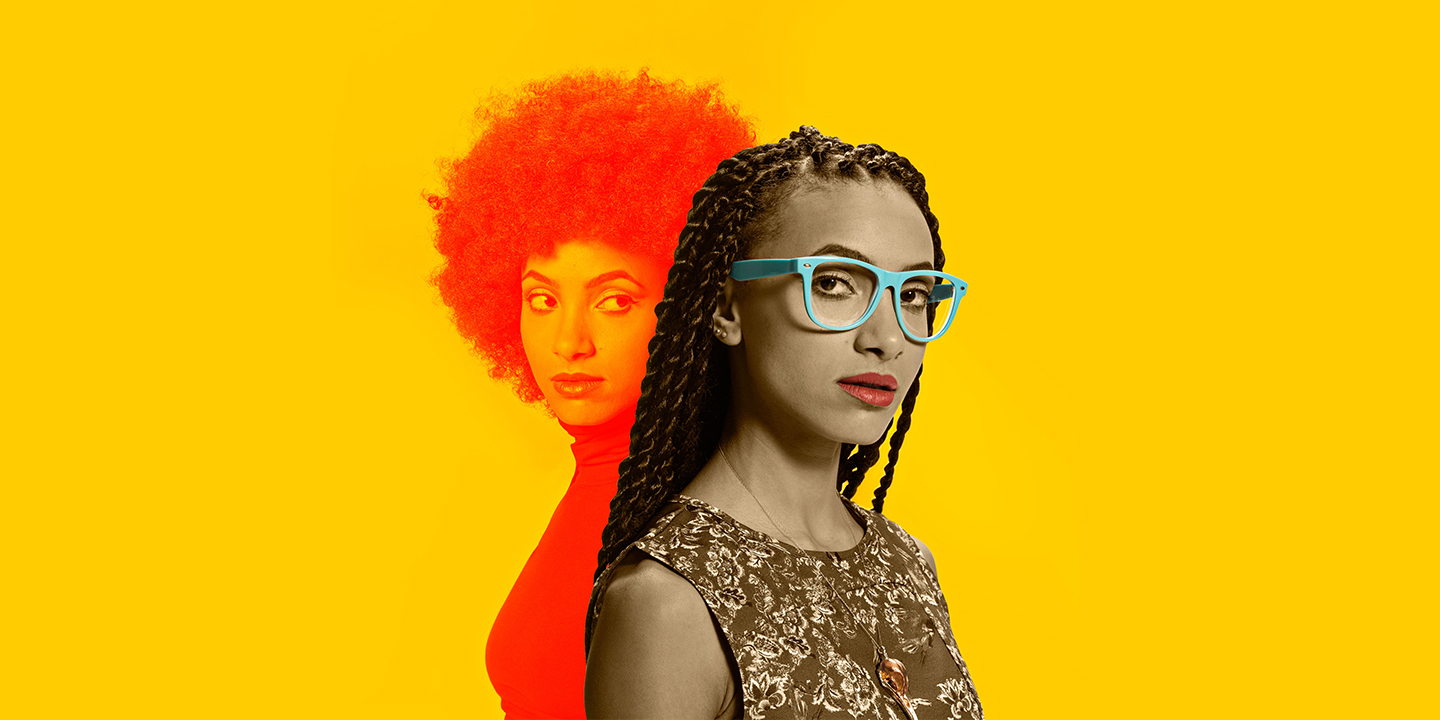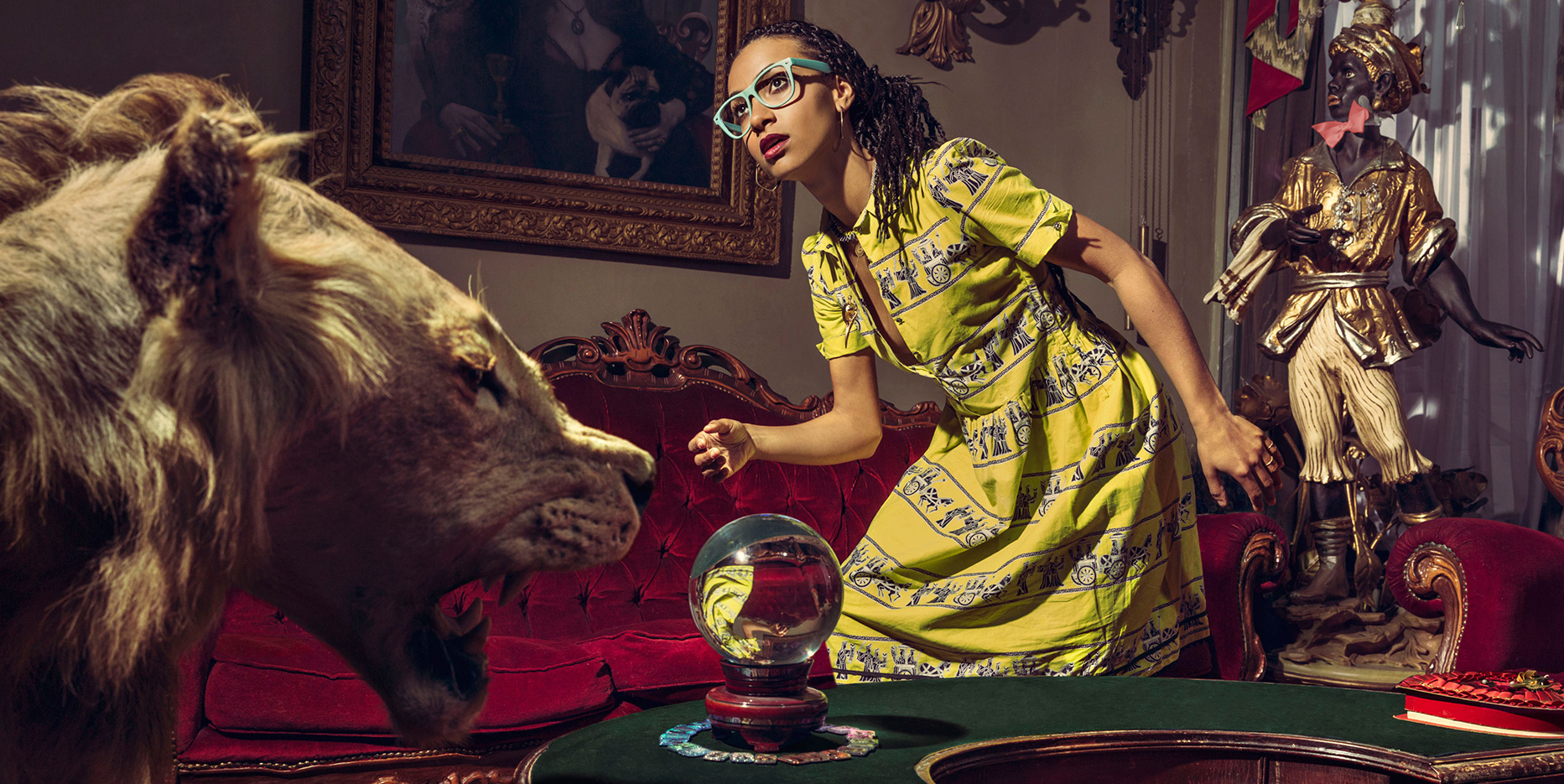

Esperanza Spalding is an unlikely figure in the 21st century, a vocalist and bass player who rose to national prominence by singing and performing jazz music. Through four albums, multiple performances at the White House as the guest of President Barack Obama, a Best New Artist win at the Grammys (making her the first jazz artist to ever triumph in that category), and glamorous trips down the red carpet that have made her something of a style star, she has consistently released music that recalls jazz history—especially ’70s fusion—while also being smartly, subtlely contemporary in ambiance and inspiration.
But now, the 31-year-old is throwing a curveball with the conceptual Emily’s D+Evolution, in which she fully channels Emily, a playful persona who has an interest in physics and staging makeshift plays. While the themes of the album aren’t entirely clear even to her, Spalding thinks of the record as an attempt to get back to a childlike curiosity and freedom in her practice—her version of Picasso’s famous declaration that, “It took me four years to paint like Raphael, but a lifetime to paint like a child.” “Emily knocked on the door of me, and I opened it and said, ‘Well, what do you want to do?’” Spalding says of her alter ego. “And she said, ‘I want to move and I want to be loud.’”
So Emily’s D+Evolution is more dissonant and noisily complex, with something of the clang of a kid banging pots together, but gorgeously so. Her beautiful voice is, at times, twisted into scats and drones. On the cover and in the trippy video for the psych rock-y first single “Good Lava,” her signature afro is tied into long braids as she sports a pair of kitschy eyeglasses on her usually bare face. She toured the new songs for about a year before recording them, and they put forth a woman at the height of her artistic powers seeing how far she can push things—while also seeing how much fun she can have. In conversation at a coffee shop in Manhattan’s Chelsea neighborhood—hair in Emily’s braids, and eyes behind big frames—Spalding seems most of all like a musician uninterested in the pressure of unwanted expectations.
Pitchfork: You’re the only jazz musician in history that’s won the Grammy for Best New Artist.
Esperanza Spalding: I hope I’m wrong but sometimes I wonder if that was a PR move by the Recording Academy, because they were going to cut all of these other categories that non-pop artists usually get nominated in. So it was like giving something to the non-pop community.
Pitchfork: I don’t think you are giving yourself enough credit.
ES: I’m awesome! I embrace it. I’m just saying it just felt so weird.
Pitchfork: Is reaching a large audience something that interests you?
ES: It doesn’t give me feedback for my work, because there’s so much shit that reaches a lot of people that I don’t like at all. And then there’s the juiciest music that makes me so happy, music that I need on that deserted island when I’m stranded for the rest of my life, and nobody cares that it’s there.
Pitchfork: Why do you think there are so many jazz singers who have a hard time resonating in the way that you have?
ES: Well, they resonate where they resonate. We also live in a time where there is a cult of beauty, and I know that I have the free pass to get into that fucking club.
Pitchfork: Because you are beautiful?
ES: Yeah, it’s just the luck of the stars. It’s crazy shit, and I think about it a lot, and it hurts my heart, because it’s stupid. It’s fucking stupid. If my face looked like this granite tabletop, I would still write and sing and play the same way, and it would be fucking hard to get people to pay attention to me. It irks my soul from two sides: One, people I know who are fucking ingenious performers, writers, poets, or philosophers can’t get a gig or a manager because they don’t look great or have the right body or whatever. And on the other side—actually it doesn’t bother me as much as the first—but I know I’m invisible because I’m just a shell that’s seen as “a pretty person that does something.” That’ll change in like 20 years, because I’m a woman, so I’m just milking it while I’m still considered young and pretty. It’s weird sometimes to have people not see me or see what I do.
Pitchfork: Are you trying to throw a wrench in those expectations with this album, because your voice sounds less outright pretty here than your past releases.
ES: No. But I am insubordinate by nature. I can't help it. And I don’t know if I was trying to sing pretty before, I think it was just a coincidence. With this record, I had no goal for the sound, no goal for the way I was gonna do it. I was working for this being called Emily, and I really felt like my job was to honor her philosophy or her sound or her art or her moment. So it kind of didn’t feel like it was me. I was going in and singing a song that was, in a way, somebody else’s philosophy.

Pitchfork: Your success has put you in a unique position to have a relationship with the Obamas. What are they like?
ES: Tall. They’re so tall.
Pitchfork: They seem really interested in music—are they?
ES: Of course. They love jazz, they love creative shit. They’re just interesting creative people. That’s what it seems to me.
Pitchfork: Are you a Bernie or Hillary person?
ES: I'm a Bernie girl.
Pitchfork: When you perform at places like the White House, where you just played “Sunny Side of the Street,” do you feel like you are representing jazz to the nation?
ES: I shouldn't be. With all the motherfuckers who are still alive today who are the essence of that music, it's bullshit if I am representing jazz. But that's what popular culture will do for you—it will fucking change the narrative and tell you something is that is not.
Pitchfork: Was it your choice to do "Sunny Side of the Street"?
ES: Yeah, they asked me to do a classic jazz standard.
Pitchfork: And you like that song?
ES: I love that song!
Pitchfork: Do you like popular jazz standards?
ES: I like the ones I like.
Pitchfork: Do you like classic jazz vocalists like Sarah Vaughan and Ella Fitzgerald?
ES: Yeah, and I also like Doris Day and fucking non-jazz vocalists.
Pitchfork: Who are some of your favorite singers?
ES: I love Aretha Franklin, Edith Piaf, Blondie.
Pitchfork: Do all those different artists influence your voice?
ES: It's like a dictionary. If you're a writer and you write fiction, that's not all you read. I just like people doing good shit.
Pitchfork: Joni Mitchell is a clear vocal influence on this album. What do you like about her?
ES: She's so hardcore. It's weird being a pretty woman doing something real now, but for her 50 years ago... I've seen videos of her performing where you can tell the guys are so uncomfortable. They can't even smile right because they don't know what to do because she's singing, writing, and producing them under the table. And it's not just about her voice. It’s the whole thing. It's the sensory experience of the poetry, of the sound, of the harmonies. Whether my brain is on or not, it moves me.
Pitchfork: She produced everything herself, and you often produce your own work, too.
ES: She’s just a strong motherfucking artist. I will not generalize on anybody's behalf, but whoever you are, if you know what you're doing, you don’t want other people to overtake the merit of your art.
Pitchfork: Do you experience that still?
ES: Of course, anybody in this fucking world experiences that.
Pitchfork: Jazz can feel generally very male...
ES: Everything is male, man. Everything is male.
Pitchfork: Have you experienced being in the studio and someone being like, “Hey, you don’t know how to do this”?
ES: Yeah, and sometimes I didn't know how, which is cool too. There’s two sides of the coin: One where people don't expect you to do anything and won't let you do anything because they think you don't know how, and then the other side is when you're fucking up but they won't tell you because you're a girl. Then you don’t learn. But ultimately all that is complete bullshit, because if you wanna become better and do whatever it is you're doing, that is the rip of a Band-Aid.
“There’s so much shit that reaches a lot of people that I don’t like at all. And then there’s the juiciest music that makes me so happy, and nobody cares that it’s there.”
Pitchfork: Are you generally fearless when you perform?
ES: You don’t have to be fearless to do anything, you can be scared out of your mind. I fear that I won’t get better and that I won’t have time to practice. To be called a "jazz musician"—it's a big responsibility.
Pitchfork: Would you say you are living up to that responsibility?
ES: I'm one of those people that if I don't practice a lot, it goes down really fast. And there’s some videos out there of me sucking, because I was too fucking busy, and I hate that. But fuck it. That was a wake up call.
I just don't want to get stuck. Anything you do, somebody is going to say something. Fuck that. You have to do it, because it's who you fucking are and you didn't sign any contract that said, “I promise to forever be exactly like A B C D E F and G, yours truly, signed me.”
When I see anything that I like, what I’m identifying with is the vision or the idea—whatever was the little nugget that started it. Our job is to take those nuggets all the way. And as long as you do that, you’re fine. As long as you don’t wimp out nine tenths of the way there, then you're golden.
